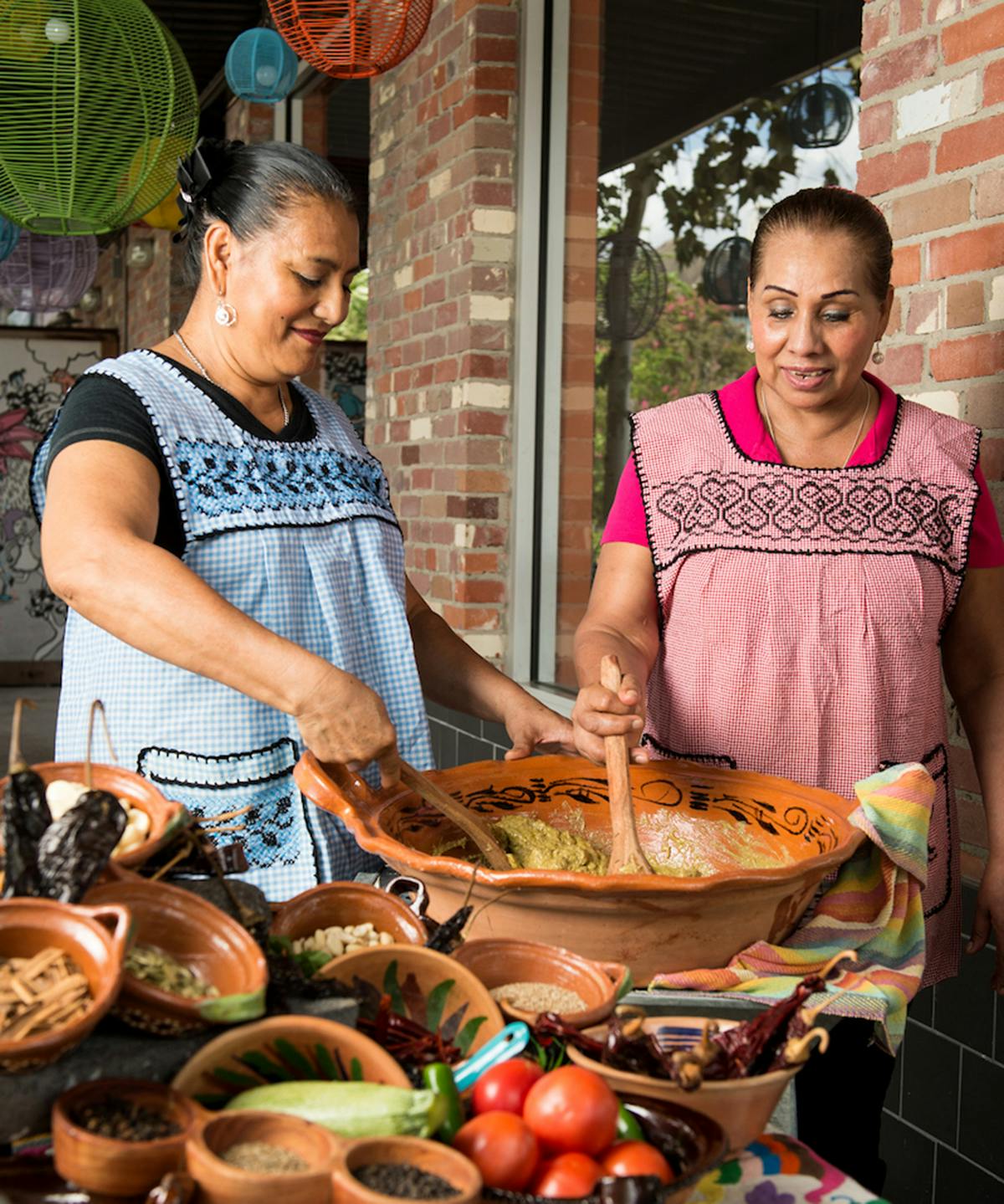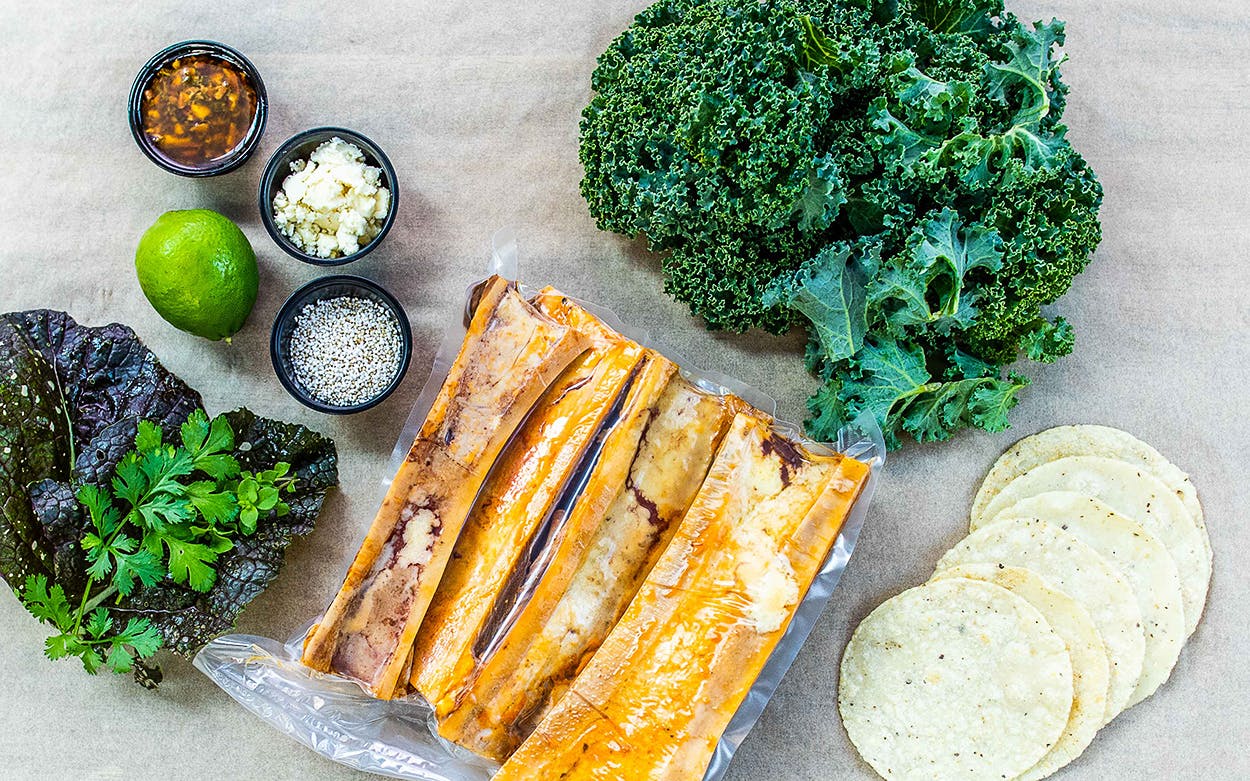Comedor’s co-owner and pastry chef, Philip Speer, and executive chef, Gabe Erales, were ahead of novel coronavirus concerns back in early March, before SXSW was canceled. They put in place critical new standard operating procedures and seemed prepared for anything. But after Austin and Travis County officials forced the closure of restaurants and bars for dine-in service on March 17 because of the COVID-19 pandemic (Governor Greg Abbott closed dining rooms statewide three days later), the leadership team knew the modern Mexican restaurant would need to close at least temporarily while they discussed possible alternate methods of continuing operations. Ultimately, they decided the best course of action was to deliver home-cook-friendly recipe meal kits, and on March 30 they began offering par-cooked dishes selected from their menu.
A few weeks later, they launched Assembly Kitchen, a separate concept that works with other restaurants to deliver meal kits. Right now, Assembly Kitchen offers Comedor’s taco kits as well as selections from Holy Roller and Assembly Pizza and cocktail kits from Garage, the bar adjacent to Comedor.
“When the world changes, we change,” Erales says. But this is no minor adaptation. Adds Speer: “It’s literally like opening a new restaurant because maybe there’s not menu items to figure out conceptually, but there are a lot of new logistics.” Those include packaging, labeling, portioning, and making sure everything matches up.
“We want to be responsible for what we’re doing,” says Speer. “We can manage every piece just as we handle the sterile delivery. We handle the food coming in—it’s our chefs creating that. And we know the products that we’re giving you … Also, it’s a new way of looking at something long-term and innovative that can be a very big part of the way that people dine now and in the future. We’re not doing anything super new as far as the meal kit service. We’re incorporating the high-end restaurant aspect of it with chef engagement.”
That’s right, customers get virtual access to the Comedor kitchen with each Assembly Kitchen order from the restaurant. Along with the ingredients for popular orders like family meal packs and the restaurant’s bone marrow tacos, the best-seller, is a recipe card with a QR code linking to a video tutorial with Speer and Erales.
Texas Monthly executive editor and restaurant critic Patricia Sharpe, who lives in Austin, ordered meal kits for testing at home. She selected the quesadilla, the goat barbacoa tamal, the pork belly memela, and a couple of desserts. “The overall impression is first-rate,” she says. “The recipes are very clear, and the portions are large and nicely packaged. The delivery was on time. Prompt.” This is everything one expects of a top-tier operation such as Comedor, which Sharpe named her top new restaurant of the year. That being said, she notes that although the recipes aren’t advance or complex, inexperienced home cooks might need more guidance. “I would recommend them with that caveat,” she says.
Our critic’s favorite was the quesadilla, Comedor’s thick blue heirloom masa tortilla filled with Oaxaca cheese, fresh huitlacoche, and Texas mushrooms. “There was a little container of smoked fresno chile salsa, which was absolutely fabulous,” she notes. “It had a wonderful depth of flavor and smoke, from the chiles being roasted. There was a lime wedge. Basically this was a matter of sautéing the fillings, heating up the tortilla, and then doing a final 45 seconds with the filings inside the quesadilla. The tortilla was very large, so this could be easily shared.”
Sharpe also enjoyed the goat barbacoa tamal, which she compares to cooking sous vide. “The tamal came wrapped in a banana leaf in a vacuum-sealed plastic container. You just heat it up in simmering water. Done! Then, you heat the (unfortunately named) goat-fat salsa on the stove. Once the tamal is hot, you pour on the salsa, garnish the whole thing with radishes, avocado, and some very pretty blooming cilantro stems. That was a nice touch.”
Fermín Nuñez, executive chef at Suerte, another popular modern Mexican eatery in Austin, launched meal kits for his restaurant’s suadero tacos, which the restaurant offers for curbside pickup Thursday-Saturday (ordering opens every Tuesday at noon). “Those tacos are by far the most popular item on the menu,” Nuñez says during a Zoom call. For perspective, he explains, on any given day before COVID-19 restrictions were put in place, Suerte’s kitchen would send out 100 orders of suadero tacos, compared with 40 to 45 orders of everything else on the menu. “It’s the number one seller, and we kind of have this joke that it will be suadero that saves this restaurant.”
For Nuñez, the meal kits weren’t just a way to extend the restaurant experience into homes; they were also a way to keep his crew employed and get creative, figuring out how to cook five hundred pounds of meat a week before passing it off to the customer. “Making the suadero kits was the best way to execute at a level that we wanted, at the quality that we wanted, to be able to make some money to have a restaurant when all this is over,” the chef says. “We knew people would definitely want it in their house right now. We do all the heavy lifting. You’re doing the magical little touches, but it feels like you did the whole thing.” Available for $55, the kits include a pound of confit wagyu brisket that you finish off at home, house-made tortillas, avocado crudo salsa, and the aptly named black magic salsa, along with sides of fideo seco, charro beans, and kale salad. Desserts, like a wild-blueberry clafoutis and dough for lemon cheesecake cookies, and cocktail kits are also on the menu (shrimp taco kits are also available for $65).
Operating as typical takeout wouldn’t be the same, Nuñez says. There’s an experience to finishing the meat, tossing it in the salsa, and warming the tortillas. “That smell, you can’t put a price on that. It’s going to bring people that much more joy. Rather than opening a package of food that you have to eat at that moment. It wouldn’t be the same.”

In Houston, Ana Beaven, owner of Cuchara Restaurant, offers salsa kits, cook-at-home rice pudding packs, and, most elaborately of all, packs with everything needed to make tamales. Those tamale meal kits were released near the end of April with companion YouTube and two-part Facebook video classes.
The $25 tamales package includes seasoned powdered masa, shredded chicken cooked in salsa verde, lard, chicken broth, and dry corn husks. It’s enough for two dozen tamales. A steamer goes for an extra $25. Once at home, Beaven says, customers can cue up the YouTube or Facebook videos. “In the class, we give tips for those that don’t have a steamer and don’t want to get one.” The videos are master classes in traditional cooking hosted by the restaurant’s head cook, who goes by Angelita Cuchara. Stoic, soft-spoken Angelita leads the viewer through the preparation and cooking in Spanish with Beaven translating. The YouTube video begins with a recommendation not to wear gloves when making masa for tamales. Meanwhile, the Facebook video begins with Angelita awkwardly, endearingly smiling and waving in silence and then urging for viewers to wash their hands. It’s the stuff of Mexican abuelita cooking dreams. There’s theater and utility and the end result of gustatory satisfaction.
Will these programs continue now that the governor has said restaurants can reopen? Neither Comedor, Suerte, nor Cuchara plan to seat diners anytime soon, nor do they intend to stop meal-kit production, giving at least a little comfort to people skittish about stepping into restaurant dining rooms.
As Erales says, “We look forward to the day we can share our food, our cocktails and wine, and, most importantly, ourselves under the same roof again.”








